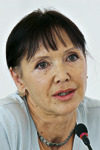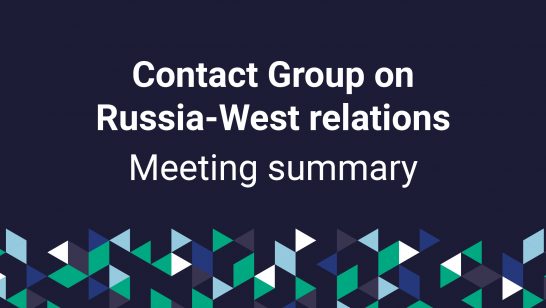
In the context of the Ukrainian crisis and deteriorating Russia –West relations, it comes as no surprise that people are now asking themselves if we are heading towards a new Cold War. However, the Cold War was the name given to a particular if not unique state of international relations. The phenomenon of the Cold War lay in several specific features: first, a clearly defined bipolar structure in international relations; second, a severe East-West ideological and military political confrontation; third, an unprecedented arms race; and fourth, in local or regional conflicts, the superpowers found themselves on opposite sides of the barricades or fought directly against the other superpower’s “client”. Nowadays, none of these features are in place in the post-bipolar international system.
However, the post-bipolar polycentric world is strongly influenced by the evolving balance between two opposite trends – the trend towards multilateral cooperation on global challenges and the trend towards a new bipolarity which will be totally different from the East-West bipolarity. This new bipolarity may be a confrontation between so-called democratic or liberal capitalism and authoritarian capitalism. The new bipolarity, if it happens, will be formed around two poles – the US and China, and other countries will have to take sides with these two poles. The main dividing line in a new ideological confrontation would revolve around different interpretations of relations between the people and the state, who serves whom and what makes a great power: the freedom and prosperity of its people or the ability to subjugate and frighten others?
In this context Russia‘s self identification will be crucial for the evolving balance of power in international relations and consequently for the regional and international security. There exist many definitions of Russia –“Russia as a Eurasian nation”, “Russia as Euro-Pacific nation”, and “Russia as new Europe”. But none of these labels clearly defines Russia’s identity which does not depend on geography or ethno- religious background.
Rather, Russia can be defined as a European nation with a huge territory in Asia and very tragic history that many times took it away from Europe in terms of its internal development. Russia can also be viewed as “late Europe”, because it started its controversial journey towards democracy almost from scratch after the collapse of the USSR, while the leading Western countries have been following this path for tens or hundreds of years, also making big historical zigzags and retreats at times.
Put simply, Russia’s foreign policy has always been not so much about relations with foreign states but rather about the choice of a model for its political and economic evolution. From this point of view Russia’s relations with the West should not be assessed only in terms of abstract criteria or relations with the United States and European Union but first and foremost in terms of what Russia ultimately wants to become.
In the wake of the 2008 financial crisis, it dawned on the Russian population that having a modern economy meant being part of the modern or European world which largely comprises the EU (as its main trading partner), the US, Japan and South Korea. The realignment of Russia’s relations with the US, the EU, Norway and Ukraine was a reflection of the new understanding. However, although the imperative to modernize was creating a new model for Russian relations with the European Union and the West at large, from the outset there was no consensus among the Russian political elite on what exactly modernization entailed. Moreover, Russia’s modernization created a threat for the existing political and economic model and consequently for the ruling political elite. The latter realized that Russia’s economic modernization could not but go hand in hand with its political modernization including a reasonable and balanced division of powers, an independent judiciary, and arbitration bodies able to manage and restrain the bureaucracy and corruption. If all this were implemented it would have a strong impact on Russian foreign policy but it would deprive the hydro-carbon nomenclature of its power. This is why the authoritarian substance of the Russian leadership defeated its superficial European vocation.
Although the criticism by Russian and foreign politicians and analysts of Putin’s administration for its curtailing of democratic laws and institutions is fair in many ways, such an approach ignores more fundamental problems. The West greatly underestimates its own role in events within and around Russia after the collapse of the USSR. Russia’s Western partners have never fully understood the reverse link between Russia’s internal evolution and its international environment. The better the relations and the greater the cooperation in the fields of economics, politics, security, humanitarian questions, and culture, the more solid will be the position of democratic forces within Russia, the more the public will come to embrace democratic freedoms, and the more the authorities at every level will pay attention to observing democratic norms and procedures.
When Putin came to power in 2000, he hoped to improve Russia’s global prestige not on the basis of unilateral concessions as Yeltsin had, but on an equal footing with other key powers. His expectations were disappointed by Western regional strategies – be it NATO’s enlargement or the EU’s Eastern partnership, which were meticulously bypassing Russia. Had Russia been included into NATO’s enlargement strategy, the Caucasus crisis would have never happened. And had Russia been included in the EU Eastern Partnership from the very beginning, the Ukrainian conflict would not have erupted. The uncomfortable truth for the West is that as long as Russia shares the continent with the EU and NATO, which possess huge economic, technological and military power – “without Russia” will be always interpreted by Moscow as “against Russia”. And since Russia has not yet found its proper place in post-bipolar Europe, it will be searching for its own allies. For the time being Russia cannot present an attractive model for the CIS neighbours, but it has enough recourses to oppose those Western strategies that are perceived as a threat to its national interests.
Now Putin has no illusions about the integration of Russia with the West. He wants Russia to remain a sovereign centre of power, with its area of primary influence based on the Eurasian Union (virtual though it is for the time being). And Moscow’s growing differences with the United States and Western Europe over internal political issues push it further towards rapprochement with China and other countries that do not raise such questions and are often similarly criticised themselves.
The future of Russia-West relations and international security will depend on the outcome of the Ukrainian conflict. A future paradigm shift would be contingent on the West defining a clear strategy vis-à-vis Russia, based on a careful balance between its values and realistic objectives as well as the lessons drawn from the past. As for Russia, nowadays we see that it was naïve to think that the highly centralized authoritarian Russian system that existed for centuries could be smoothly transformed overnight.
In the interview published by the Polish newspaper Gazeta Wyborcza in 2002, president Putin said that “Russia without any doubt is a European country because it is a country of European culture”. One cannot but agree with these words because culture is central for a nation’s genetic code and cannot easily be changed. This means that Russia will inevitably come back to the European path. Let us hope that it won’t take another 70 years.
The opinions articulated above represent the views of the author(s), and do not necessarily reflect the position of the European Leadership Network or any of its members. The ELN’s aim is to encourage debates that will help develop Europe’s capacity to address the pressing foreign, defence, and security challenges of our time.


